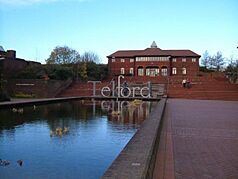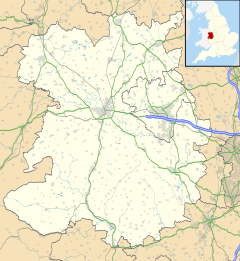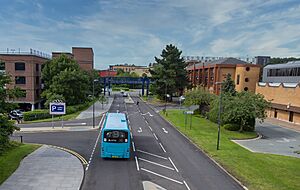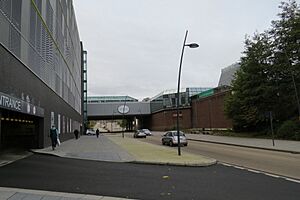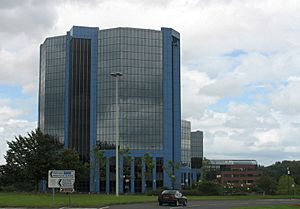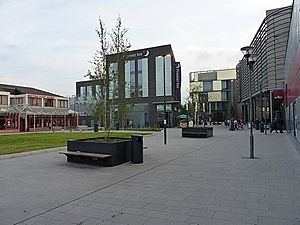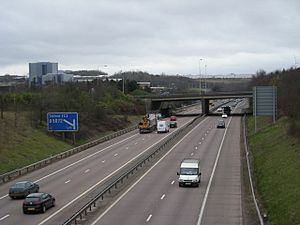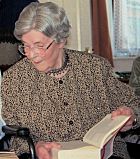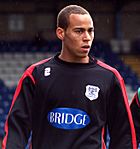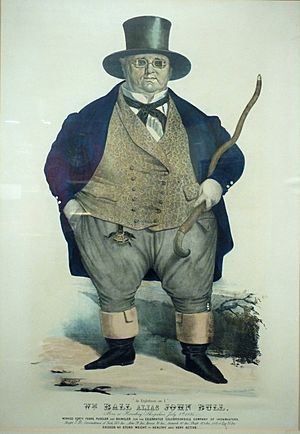Telford facts for kids
Quick facts for kids Telford |
|
|---|---|
|
From top, left to right: Telford centre's skyline, Southwater, Town Park, Telford Centre, Lawn Central and Thomas Telford Sculpture |
|
| Population | 155,570 (2021 Census) |
| OS grid reference | SJ698088 |
| • London | 140 mi (230 km) SE |
| Unitary authority | |
| Ceremonial county | |
| Region | |
| Country | England |
| Sovereign state | United Kingdom |
| Post town | TELFORD |
| Postcode district | TF1–5, TF7 |
| Dialling code | 01952 |
| Police | West Mercia |
| Fire | Shropshire |
| Ambulance | West Midlands |
| EU Parliament | West Midlands |
| UK Parliament |
|
Telford is a large town in Shropshire, England. It is part of the Telford and Wrekin area. The town is close to the River Severn and the famous The Wrekin hill. This hill is part of the Shropshire Hills, a beautiful natural area. South of Telford is the Ironbridge Gorge, a UNESCO World Heritage Site. This area is known as "The Birthplace of Industry" because many important factories were built here during the Industrial Revolution. Telford is also the main office for the Telford and Wrekin Council.
The M54 motorway was finished in 1983. This road helps people travel easily to cities like Wolverhampton (about 19 miles away) and Birmingham (about 28 miles away). In 2011, Telford had a population of 142,723 people. It is the biggest town in Shropshire. Shrewsbury is the second largest, about 15 miles west of Telford.
Telford is a "new town," which means it was planned and built from the 1960s to the 1970s. It was named after Thomas Telford, a famous engineer who built roads and canals. The town was first called Dawley New Town. Telford includes several older villages and towns like Coalbrookdale, Dawley, Madeley, Newport, Oakengates, and Wellington.
Contents
History of Telford
Early Settlements in the Area
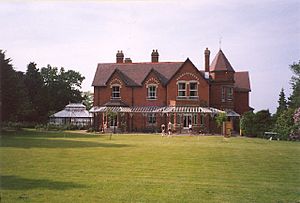
People first settled in this area on land that sloped up from the Weald Moors. This was near where the Roman road Watling Street was built. In the 10th century, there were three large farms in Wellington, Wrockwardine, and Lilleshall.
By the 13th century, towns like Wellington and Madeley grew. Monasteries, which are places where monks live, helped the area's economy grow. They owned a lot of land and made money from coal and iron mines.
In 1821, there was a protest called the Cinderloo Uprising. About 3,000 people protested because their wages were lowered in the coal mines. Sadly, three workers died during these protests.
How Telford Became a New Town
The idea for a "New Town" started on January 16, 1963. It was first called Dawley New Town. It covered a large area including Dawley, Oakengates, and Wellington. The first homes were built in 1967 in the Sutton Hill area.
In 1968, the plan was expanded to include the historic Ironbridge Gorge. On November 29, 1968, the new town was officially renamed Telford. It was named after Thomas Telford, a Scottish engineer who worked in Shropshire. Other names suggested were Dawelloak and Wrekin Forest City.
Most of Telford's roads and buildings were built from the late 1960s to the early 1990s. By then, Telford was an important town in the region. In 1983, the M54 motorway was completed. This road connected Telford to the M6 motorway and the rest of the UK's main road network. Other important roads are the A5 and the A442, also known as Queensway.
Many people who moved to Telford in the 1960s and 1970s came from the West Midlands cities like Birmingham and Wolverhampton. Some people already living in the area were not happy about these changes. They sometimes called the new residents "overspill."
In 2007, a big plan was announced to improve the town centre. This plan included making the area around the shopping centre better for walking and adding new cafes, bars, and shops. This created 1,750 new jobs. The first part of this plan, called Southwater, was finished in 2014. It has a new library, restaurants, a cinema, and a bowling alley.
Geography of Telford
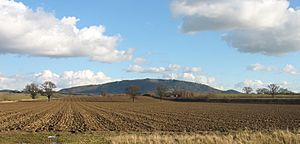
Telford town centre is about 16 miles east of Shrewsbury and 20 miles north-west of Wolverhampton. The town covers a large area of about 30 square miles. The southern and eastern parts of Telford are on the East Shropshire coalfield. The northern part of Telford is on sandstone.
The town centre is on a watershed. This means that water to the south flows towards the River Severn. Water to the north flows towards the Weald Moors. The town is overlooked by The Wrekin, a large hill that is 407 meters (1335 feet) high.
How Telford is Governed
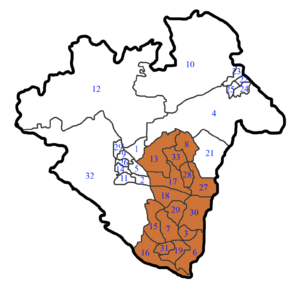
Telford is part of the Telford & Wrekin borough. The town does not have one single town council. Instead, it is divided into smaller areas called Wards. These Wards are used for elections and surveys. Telford was created by joining several older, independent towns like Wellington, Madeley, Oakengates, and Dawley. Even though it's one town now, you can still see the differences between these older areas. Some small places like parts of Ironbridge are managed by Shropshire Council, not Telford & Wrekin.
Telford has its own Member of Parliament (MP) for the Telford parliamentary area. This seat was held by the Labour Party from 1997 to 2015. Since 2024, Shaun Davies (Labour) is the MP. Some parts of Telford, like Wellington, are in a different parliamentary area called The Wrekin. Mark Pritchard (Conservative) has been the MP for The Wrekin since 2005. Telford is part of the West Midlands region of England.
People of Telford
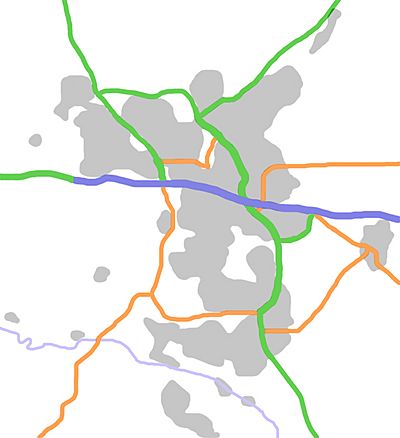
When Dawley new town was planned in 1963, it was meant to welcome 50,000 people from the West Midlands conurbation. The goal was for the town to grow to 70,000 people or more. By 1968, with the expansion to Telford, the aim was to reach 220,000 people by 1991. However, by 1983, Telford's population was just under 108,000.
In 2011, the population of Telford's built-up area was 147,980. This area includes towns like Dawley, Oakengates, Wellington, and Madeley. In 2011, about 91.9% of the town's people were white, 4.7% were Asian, and 1.2% were Black. The population was estimated to be 147,105 in 2016.
Economy and Jobs in Telford
| Population and Employment | |||
|---|---|---|---|
| Date | Population | No. of Jobs | % of Jobs on Ind. Estates |
| 1968 | 74,750 | 35,671 | 1.4 |
| 1969 | 76,200 | 35,710 | 2.4 |
| 1970 | 78,200 | 35,948 | 5.1 |
| 1971 | 80,800 | 36,191 | 7.2 |
| 1972 | 84,200 | 36,743 | 9.3 |
| 1973 | 87,100 | 39,861 | 11.4 |
| 1974 | 89,000 | 40,928 | 13.2 |
| 1975 | 90,000 | 40,986 | 12.3 |
| 1976 | 93,980 | 42,036 | 14.9 |
| 1977 | 97,900 | 43,637 | 15.4 |
| 1978 | 100,300 | 44,681 | 16.8 |
| 1979 | 102,000 | 44,247 | 18.2 |
| 1980 | 104,200 | 42,397 | 18.3 |
| 1981 | 104,200 | 39,414 | 16.8 |
| 1982 | 106,600 | 38,852 | 18.2 |
| 1983 | 107,700 | 39,037 | 19.9 |
In the late 1960s, when Telford was new, many people did not have jobs. This was a problem for the town.
However, in 1967, the Halesfield Industrial Estate was built. This was a big step in creating jobs. Other large industrial areas followed, like Stafford Park in 1973 and Hortonwood in 1979. These places helped reduce the number of people without jobs.
Between 1968 and 1983, many new factories were built. This made Telford an attractive place for businesses to invest. By 1976, Telford started to attract companies from the US, Europe, and Japan. These foreign companies needed bigger factories. By 1983, about 40 foreign companies, mostly American, provided over 2,000 jobs in Telford. These new companies focused on high-tech industries, not heavy metal work.
New companies included Unimation from America and three Japanese companies: Nikon UK Ltd., Hitachi Maxell, and Ricoh. Ricoh built a factory in Priorslee near the M54 motorway.
From the late 1970s, Telford started to attract high-tech companies. The service industry, like shops and offices, also grew in the Telford Town Centre area. However, there were still job losses in the early 1980s due to a national economic downturn. Unemployment was very high in 1983, almost double the national average. But by 1983, the rate of job losses was slowing down.
Unemployment in Telford was still high in 1986, around 20%. But it fell a lot by the end of the decade. In recent years, Telford's economy has become stronger. In 2019, the average weekly earnings for full-time workers in Telford and Wrekin were £563.
Telford has attracted several large IT (Information Technology) companies. These include EDS, Capgemini, and Fujitsu. These companies provide many jobs, especially in supporting government services like HM Revenue & Customs (HMRC). The growth in these jobs helped Telford's economy recover after 1992. By August 2007, unemployment had dropped to 3.3%.
However, during the economic downturn in the late 2000s, unemployment rose to 5% by February 2011. This was still lower than the national average.
The local evening newspaper, the Shropshire Star, used to be based in Ketley. There is also a free local paper called the Telford Journal. In 2023, the Shropshire Star building was moved to Telford Town Centre.
Some jobs have been lost in Telford. For example, 500 jobs from the Ministry of Defence (MoD) moved to Bristol. The sugar beet factory at Allscott closed in 2007.
In 2019, a company called Rheinmetall BAE Systems Land opened in Telford. They work on important projects like the Challenger 2 Life Extension Project for tanks.
Areas of Telford
South of M54 Motorway
Aqueduct, Brookside, Dawley Bank, Doseley, Hollinswood, Heath Hill, Horsehay, Lawley, Lawley Bank, Lightmoor, Little Dawley, Malinslee, Newdale, Old Park, Overdale, Randlay, Stirchley, Sutton Hill, The Rock, Tweedale, Woodside.
North of M54 Motorway
Arleston, Donnington, Donnington Wood, Hadley, Hartshill, Haybridge, Ketley, Ketley Bank, Ketleybrook, Ketleyhill, Leegomery, Muxton, Priorslee, Red Lake, Snedshill, St Georges, Trench, Trench Lock, Wombridge, Wrockwardine Wood.
Surrounding Towns and Villages
Blists Hill, Coalbrookdale, Coalport, Dawley, Ironbridge, Jackfield, Madeley, Newport, Oakengates, Wellington, Admaston, Bratton, Dothill and Shawbirch.
Industrial Areas
Hadley Castle, Halesfield, Hortonwood, Stafford Park
Famous Places in Telford
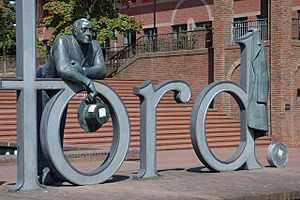
The main shopping and business area is Telford Town Centre. It is located near Junction 5 of the M54 motorway. The offices for Telford & Wrekin Council are also here. The large Telford Shopping Centre and the Telford Town Park are in this area. There are also office buildings like the blue towers called Telford Plaza.
Telford has one of the few ice skating rinks in the Midlands. It is near the Telford International Centre (TIC). The TIC is a large place for exhibitions, parties, and concerts. It used to host the UK Snooker Championship.
A major landmark in Shropshire, now part of Telford, is The Iron Bridge in Ironbridge. It was the first bridge of its kind in the world made from cast iron. The Ironbridge Gorge area is a UNESCO World Heritage Site. The most important natural landmark is The Wrekin hill. There is also the Lilleshall Monument on Lilleshall Hill.
Education in Telford
Telford has many primary and secondary schools. Some are academies, like The Telford Langley School. Others are City Technology Colleges, like the Thomas Telford School. About 8 miles north of Telford are Adams' Grammar School and Newport Girls High School in Newport. These are selective schools. Wrekin College is a private school in the Wellington area of Telford.
For further education, there is Telford College. This college was formed in 2017 when Telford College of Arts and Technology (TCAT) and Telford New College merged. There are also four other sixth forms at Haberdashers' Abraham Darby, Holy Trinity Academy, Madeley Academy, and Thomas Telford School.
Telford is also home to a campus of The University of Wolverhampton Business School. Harper Adams University, which focuses on farming and land-based education, is about 9.5 miles northeast of Telford.
Media in Telford
Local news and TV shows for Telford come from BBC West Midlands and ITV Central. TV signals are received from the Wrekin TV transmitter. Local radio stations include BBC Radio Shropshire, Hits Radio Black Country & Shropshire, Greatest Hits Radio Black Country & Shropshire, and Capital North West & Wales. The Shropshire Star is the town's local weekly newspaper.
Transport in Telford
Telford is at the end of the M54 motorway. This road connects the town to Wolverhampton and the wider West Midlands. The A5 road also passes through Telford, linking it to Shrewsbury and Cannock.
Telford Central railway station is on the line between Shrewsbury and Wolverhampton. The town also has Oakengates railway station and Wellington railway station on the same line. Trains from Transport for Wales Rail, West Midlands Railway, and Avanti West Coast serve these stations.
In December 2014, Virgin Trains West Coast started a direct train service from Shrewsbury to London Euston. There are also three other stations not connected to the main network: Spring Village, Lawley, and Horsehay & Dawley. These are part of the Telford Steam Railway at Horsehay.
Telford has a good transport system because it was a planned new town. This means it has fewer traffic problems compared to older cities. The M54 motorway helps reduce traffic on local roads. The A442 Queensway is a main road that runs north to south through the town.
Most bus services in Telford are run by Arriva Midlands. There are also council contract services under the 'Travel Telford' brand. These services help connect local workplaces, schools, and villages that did not have bus services before.
Notable People from Telford
Public Service
- Sir William Forester (1655–1718), a politician born in Wellington.
- Samuel Peploe (1667–1752), a bishop who was baptized in Dawley.
- Sir George Downing, 3rd Baronet (1685–1749), a politician who grew up in Dothill.
- Richard Padmore (1789 in Wellington – 1881), a politician and businessman.
- Major Charles Allix Lavington Yate (1872–1914), a British Army officer who grew up in Madeley.
- Sir Joseph Simpson (1909 in Dawley – 1968), head of the London Metropolitan Police.
- Len Murray, Baron Murray of Epping Forest (1922 in Hadley – 2004), a British trade union leader.
- Jeremy Corbyn (born 1949), former Leader of the Labour Party, grew up near Wellington.
- Professor Stephen Molyneux (born 1955), an educational technologist and former Mayor of Oakengates.
- David Wright (born 1966 in Oakengates), a Member of Parliament for Telford.
- Kim Hughes (born 1979), a British Army bomb disposal expert, went to Thomas Telford School.
Acting and Writing
- Hesba Stretton (1832 in Wellington – 1911), a writer of children's books.
- Wyke Bayliss (1835 in Madeley – 1906), a British poet and painter.
- Edith Pargeter (1913 in Horsehay – 1995 in Madeley), an English author known as Ellis Peters.
- Norman Jones (1932 in Donnington – 2013), an English actor.
- Stewart Lee (born 1968 in Wellington), an English comedian and writer.
- Paul Blackthorne (born 1969 in Wellington), an English actor.
- Anna Richardson (born 1970 in Wellington), an English television presenter.
- Christian Brassington (born 1983 in Wellington), a film and television actor.
- Jay Swingler (born 1995), a YouTuber.
Sport
- Enoch Tranter (1842 in Old Park – 1910 in Donnington Wood), an English cricketer.
- Matthew Webb (1848 in Dawley – 1883), the first person to swim the English Channel without help.
- William Dyas (1872-1940), a cricketer and local politician from Madeley.
- William Foulke (1874 in Dawley – 1916), a professional football goalkeeper.
- Will Osborne (1875-1942 in Oakengates), a Welsh rugby international.
- Joe Butler (1879 in Dawley Bank – 1941), a professional football goalkeeper.
- Sir Gordon Richards (1904 in Donnington Wood – 1986), a famous jockey.
- Ernie Clements (1922 in Hadley – 2006), an English road racing cyclist.
- Billy Wright (1924 in Ironbridge – 1994), a professional English footballer.
- Johnny Elliot (1931–2015), a Jamaican Olympic boxer who lived in Telford.
- David Ottley (born 1955), a retired athlete who won a silver medal in javelin.
- John Pender (born 1963), a retired English professional footballer.
- Mark Elliot (born 1966 in Wellington), an Olympic boxer.
- Ted Hankey (born 1968), a professional darts player who lives in Telford.
- Richie Woodhall (born 1968), an Olympic bronze medallist and former boxing champion.
- Rob Edwards (born 1982), a former footballer and current football manager.
- Ricky Balshaw (born 1986), a British para equestrian rider.
- Tom Carlon (born 1987 in Telford), an English professional ice hockey player.
- Josh Crutchley (born 1987), a British professional basketball player.
- Danny Guthrie (born 1987), a professional footballer who attended Thomas Telford School.
- Elliott Bennett (born 1988 in Telford), a professional footballer.
- Lee Collins (1988 in Telford – 2021), a professional footballer.
- Kyle Bennett (born 1990 in Telford), an English footballer.
- Mickey Bushell (born 1990), a Paralympic gold medalist who lives in Telford.
- Kelly Edwards (born 1990), a British judoka from Telford.
- Connor Goldson (born 1992), a professional footballer who attended Thomas Telford School.
- Liam Davies (born 1996 in Donnington), a WBC super bantamweight boxer.
- Ryan Giles (born 2000 in St Georges), a professional footballer.
- Penny Healey (born 2005), an archer.
Music
- Henry Gauntlett (1805 in Wellington – 1876), an English organist and hymnwriter.
- Nigel Rogers (1935 in Wellington – 2022), an English opera singer.
- Raymond Froggatt (1941–2023), an English songwriter and singer who lived in Telford.
- Steve Beresford (born 1950 in Wellington), an English musician.
- Stephen Jones (born 1962), an English musician and novelist.
- T'Pau (formed 1986), a British pop group from Telford and Shrewsbury.
- Cancer (formed in 1988), a death metal band from Ironbridge.
- The Sunshine Underground (years active 2000–2016), an alternative dance band from Telford and Shrewsbury.
- David Brown (born 1987), a British YouTuber and musician.
Science
- William Withering (1741 in Wellington – 1799), an English botanist and physician.
- Thomas Campbell Eyton (1809–1880), an English naturalist and friend of Charles Darwin.
- Dr Jacob Noel-Storr (born 1976 in Telford), an English astrophysics scientist.
Other Notable People
- William Ball (1795 in Horsehay – 1852), an iron puddler known as the "largest man in Britain."
- Samuel Parkes Cadman (1864 in Ketley – 1936), an English-born American clergyman and radio broadcaster.
Sports in Telford
Telford has many sports clubs for different levels of players.
The town's main football club is AFC Telford United. It was formed in 2004 after the original club, Telford United F.C., had financial problems. AFC Telford United plays its home games at the New Bucks Head stadium. They have won the Shropshire Senior Cup three times. They also won the Setanta Shield Trophy in 2009.
Ice hockey is popular in Telford with the Telford Tigers team, formed in 1985.
Ice racing events were held at the Telford Ice skating Rink from 1986 until 2012.
Telford has had several American football teams, including Shropshire Revolution.
For Rugby League, the town is represented by the Telford Raiders. The Telford Hornets play Rugby Union.
The Shropshire Warriors Basketball Club plays at Telford College.
The Telford International Centre hosted the UK Snooker Championship from 2007 to 2010.
Telford has four golf courses: The Shropshire Golf Centre, Horsehay Village Golf Club, The Wrekin Golf Club, and Telford Golf and Country Club.
There are also several cricket clubs in Telford. Wellington Cricket Club and Madeley Cricket Club play in the top division of the Shropshire County Cricket League. Shropshire County Cricket Club often plays at Orleton Park in Wellington.
See also
 In Spanish: Telford para niños
In Spanish: Telford para niños







